#יְהוֹשֻׁעַ
Explore tagged Tumblr posts
Text
YOU ARE UNLEAVENED!
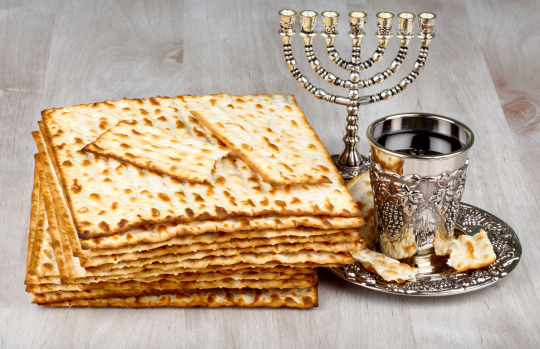
Therefore cleanse out the old leaven, so that you are a new lump, as you are unleavened. For also Messiah our Pěsacḥ was sacrificed for us. So then let us celebrate the Feast, not with old leaven, nor with the leaven of evil and wickedness, but with the unleavened bread of sincerity and truth. QORINTIYIM ALEPH (1 CORINTHIANS) 5:7-8
For seven days you are to eat matzah, and the seventh day is to be a festival for YHVH. Matzah is to be eaten throughout the seven days; neither hametz nor leavening agents are to be seen with you throughout your territory. SHEMOTH (EXODUS) 13:6-7
“And it shall be as a sign to you on your hand and as a reminder between your eyes, that the Torah of יהוה is to be in your mouth, for with a strong hand יהוה has brought you out of Mitsrayim. SHEMOTH (EXODUS) 13:9
The Feast of Matzah (Unleavened Bread) speaks of who we truly are in Mashiach-Messiah. Redeemed and delivered from a life of sin.
Yehoshua, our Passover lamb, has been sacrificed once and for all. Because of that sacrifice, our debt has been paid, and we no longer owe our lives to the grave. Just as the blood of the first Pesach sacrifices was applied to the doorposts of the homes of Yisrael captive in Egypt. Yehoshua's blood has been applied to the doorpost of our hearts. Yehovah's judgment will pass over us.
When we sin and give in to the desires of the flesh we remember who we used to be.
The crime for many believers is, they allow and entertain sin in their lives when in reality they are no longer sinners once repented, washed in the blood (water immersion), and filled with the Ruach Hakodesh.
When we partake of the Matzah, it reminds us not only that our Pesach - Messiah - also was sacrificed for us, but the He has been sacrificed so that our life could be UNLEAVENED.
This is who we truly are: righteous and without sin.
Abba. . . teach us what it means to be unleavened, to be without sin. Thank you for setting us free, that we may live a life no longer bound to the ways of the flesh. Help us Abba, to live in newness of life. Show us how to behave in following the WAY. Amein.
#thewayofyehoshua#yeshua#yehovah#torah#yeshua messiah#people of the way#yehoshua#hebrew#messianic judaism#yhvh#יהוה#יְהוֹשֻׁעַ#netzari judaism
4 notes
·
View notes
Text
Do not fear nor be dismayed, for the Lord, your God, is with you wherever you go. (Joshua 1:9) (1:9 יְהוֹשֻׁעַ) אַל תַּעֲרֹץ וְאַל תֵּחָת, כִּי עִמְּךָ יְהוָה אֱלֹהֶיךָ בְּכֹל אֲשֶׁר תֵּלֵךְ Noli metuere, et noli timere: quoniam tecum est Dominus Deus tuus in omnibus ad quæcumque perrexeris. (Iosue 1:9) Fürchte dich also nicht und hab keine Angst; denn der Herr, dein Gott, ist mit dir bei allem, was du unternimmst. (Josua 1:9) Не страшись и не ужасайся; ибо с тобою Господь Бог твой везде, куда ни пойдешь. (Иисус Навин 1:9) Ne t’effraie point et ne t’épouvante point, car l’Eternel, ton Dieu, est avec toi dans tout ce que tu entreprendras. (Josué 1:9) אל-תערץ ואל-תחת כי עמך יהוה אלהיך בכל אשר תלך (יהושע 1:9)

#Joshua 1:9#Josua 1:9#Иисус Навин 1:9#Josué 1:9#Iosue 1:9#1:9 יהושע#1:9 יְהוֹשֻׁעַ#Yəhôšuaʿ#Jehoschua#Volkswagen#Transporter#God is with you#illustration#drawing#travel#journey
521 notes
·
View notes
Text

Name: Jozwe (alt. pronunciation: Zhow-zh-weh), Maltese form of the Jewish name יְהוֹשֻׁעַ/Joshua, meaning “Yahweh is salvation”.
Surname: Cassar, Maltese surname based on Arabic قَصْر/Qasr, meaning “fortress, palace”.
Setting: Neon-23, a cyberpunk world of the 23rd century where corporations reign supreme and unchallenged... or so they think.
Occupation: Mercenary with digital specialization: hacking, information extraction, sabotage, blackmail, etc. Occasionally an assassin, always a non-direct one: his main method of murder is exploitation of the all-digital nature of the world, like orchestrating a police robot massacre or vital augmentation malfunction. He has very little passion for his job but is very good at it, and doesn’t believe there’s a better way to earn money for him that wouldn’t also completely destroy his mental health.
— One of the three protagonists of a currently-nameless N23 story (hopefully an imsim game in the perfect world). The story starts with two other protagonists, Archard Gravenreuth and Kathe Sternlicht-Landau (together known as Arcathe) deciding to take a vacation in Malta (which is a corporation-run city-state in 23rd century and not an island anymore due to climate change) some time after their participation in the revolution for the rights of androids and humans back in Central Europe.
Soon after their arrival an anonymous person puts a bounty with an absurdly handsome reward on Kathe’s head. Eager to earn a fortune, Jozwe starts spying on Arcathe, gathering info so that he could arrange a perfect “accident”. However in the process of his research Malta suddenly enters a complete lockdown, ruining Jozwe’s plans and revealing him to Arcathe. They convince Jozwe to join them in the investigation of lockdown, and together the trio finds itself in the middle of a dangerous conspiracy, while also followed by the sins of their past.
— Very thorough with his life-work balance, completely separating the two: he convinces everyone that he’s nothing but a simple code monkey (and not a very skilled one at that), constantly updates his fake resume and makes up fun stories that allegedly happened to him at “work” on his fake social media account. The only thing his neighbors are complaining about is that he’s so boring they never invite him anything unless they want someone to go hogwild on their food supplies with no useful contribution whatsoever.
He’s so serious about this because he doesn’t want to get his life ruined by involvement in petty vendettas and corporation squabbles. Having to hide a half of his life brings much misery to Jozwe, rendering him unable to seek friends and pursue his dreams. He’s incredibly good at his job, yet cannot brag about it, and even his fake persona is not allowed to be exciting, out of fear of attracting unwanted attention. He even deliberately makes the aforementioned fun work stories somewhat dull so that they wouldn’t get viral, despite his obviously great skill of entertaining people. He knows of this skill, and has a dream of becoming a streamer, but again — that means attention, and that is not allowed.
— Main way of dealing with stress is slowly turning his small apartment into a palace (yes, I chose his surname for a reason… name not so much though, sorry), designing it in what could be described as Maghrebi Cyberpunk Cottagecore style. And also designing himself in the “Hottest Man Alive” style — his understanding of make-up and fashion is outworldly.
— Jozwe’s social skills are a mess: lack of proper social interactions and anxiety of living two separate lives often gets the better of him, not made better by his natural frustration at his self-inflicted seclusion, so attempts at proper talk do often results in seemingly out of nowhere outbursts, inappropriate jokes and traumadumping, with the cherry on the cake being sudden coldness when he realizes that he might’ve said too much about himself. Nonetheless, all of this is never malicious: Jozwe is a very galant, gentle and compassionate person, it’s just very hard to see these qualities without some patience, and this patience will be handsomely rewarded with Jozwe’s deep respect and interest for his friend. This interest can be, however, sometimes overbearing — Jozwe dreamt of true friends and lovers for too long, and sometimes it will be hard for him to respect boundaries.
— Has a great sense of humor, and ironically one of the ways he developed it is through making his work stories more boring: because if you want to make something not amusing, you need to understand what makes something amusing in the first place. His favorite way of joking is with a completely straight face, and he enjoys watching people’s struggling to understand what he means transitioning into sincere laughter.
— The main reason why he’s so paranoid and diligent is because of what happened to his mothers. They were both nice (if annoyingly pragmatic) people who enjoyed stable work in the Maltese corporation, but when Jozwe was 17, they both disappeared without a trace. Corporation did let Jozwe inherit everything his mothers had, but was silent about the cause of disappearing to an absurd degree: it’s almost like his mothers never existed in the first place for the corporation, and the inheritance documents were written as if it was a simple property transaction. The whole thing made Jozwe deeply fearful, he was so afraid that he’ll end up just like his mothers, that he didn’t even try to learn what happened to them, and started working hard on saving money to escape Malta.
The main problem is that he needs a lot of money: it’s not just about moving somewhere else, it’s about doing so completely silently, changing his documents and maybe even appearance, so that not a single trace of him could be left behind for the corporation to take note of: Malta is, while ran by a corporation, a politically neutral city, where any corporation can arrange a meeting without being afraid of a knife in the back of their ambassadors, and in return Malta gets many privileges… like world-wide applicable extradition. Jozwe has been working on his dream for decades now, but is still far away from achieving it, and it takes a great toll on him.
— When Arcathe discovered Jozwe’s plan to assassinate Kathe, both sides lost their shit rather quickly: Arcathe for obvious reasons, while Jozwe was terrified by the fact that for the first time in his life his anonymity got seriously compromised. However Jozwe acts very rationally and drops the contract completely when Archard confronts him with a gun, treasuring his life way more than any money, and even decides to help Arcathe, first out of pure pragmatism, hoping that they’ll be able to get him out when the lockdown is over, then out of genuine affection: after all, this is the first meaningful social connection he got in his life.
After some time Arcathe can’t help but to adore the guy (after all Archard is a former assassin himself and Kathe is a high-ranking manager so neither are angels themselves) and soon enough simple affection turns in love, transforming Arcathe into Jozarkathe. Arkatwe. Arjozthe. Katcharwe. Archathwe. Making up ship names for policules is fun!
— Artificially born: genetic materials of his mothers were united with those of a male donor in an artificial womb. As a consequence of such unusual conception he’s a man with XX chromosomes, thus an intersex person with artificially-caused de la Chapelle syndrome. He’s obviously sterile but barely cares for it: he’d love to have kids after escaping Malta, but he has no prejudices towards adoption.
— Genetically augmented with a number of traits: prevention of intersexuality-related problems, decreased chance of eyesight issues, stronger immunity, higher endurance, cognitive abilities.
— Obviously Maltese, but three biological parents give him some very mixed heritage: Jozwe is most noticeably Euro-Maltese and Amazigh, but he also has Greek, Arab, Indian, Albanian, and Serbian ancestors.
— Brown-skinned, muscular, wide shoulders and pecs, narrow waist, big curvy nose, huge eyebrows, voluminous curly black hair, marble-smooth body (most of it is covered with a gold kintsugi tattoo) and bright brown eyes, 219 cm tall (7’1’’) and weighs ~130 kg (286 lbs).
— No, such impressive looks are not a result of genetic augmentation. There’s plenty of creepy freaks who genetically design their children to look as conforming to their beauty standards as possible, but thankfully Jozwe’s mothers weren’t that kind of people.
— His native language is Maltese. Due to job necessities and life in one of the most diverse cities on Earth he also speaks Maltese English, Tunisian Arabic and Sicilian. Later he’ll learn Hebrew and Bavarian, native languages of Kathe and Archard. Due to augmented cognitive abilities he confidently speaks all of these languages and has an easy time learning more.
— He has pets: a robot snake and seven organic rats. One of the rats is called Minmo, after an amusing cat food ad from Silent Hill 3.
— Jozwe’s favorite video game genre is strategies, sandboxes and tactical shooters, the more complex the better: Stellaris, Victoria, Dwarf Fortress, ArmA, etc.
— He loves when people call him Jozie and hates when they call him Joe. He’s not a character of a kitschie 40s pulpy noir novel, after all.
6 notes
·
View notes
Text
Jesus' real name in Hebrew is "Yeshua" (ישוע), which means "salvation." This name was common in 1st-century Palestine and is a shortened form of "Yehoshua" (יְהוֹשֻׁעַ) or Joshua. The name "Jesus" is derived from the Greek "Iesous" (Ἰησοῦς), which was used in the New Testament, and was later Latinized to "Iesus" before becoming "Jesus" in English. The evolution of the name reflects complex transliterations through different languages over time[1][4][5].
Sources
[1] What Was Jesus' Real Name? 'Yeshua' And The Story Behind It https://allthatsinteresting.com/jesus-real-name
[2] The Real Name Of Jesus Is Not Yeshua. This Is Why - YouTube https://www.youtube.com/watch?v=n-Z3ubAVIU4
[3] What is jesus christ's real name? : r/Christianity - Reddit https://www.reddit.com/r/Christianity/comments/o8osx9/what_is_jesus_christs_real_name/
[4] What Was Jesus' Full Name? (HINT: His Last Name Was Not Christ) https://www.bartehrman.com/what-was-jesus-full-name/
[5] Jesus (name) - Wikipedia https://en.wikipedia.org/wiki/Jesus_%28name%29
0 notes
Text
Bible Study: What Does The Name Jesus Mean?
What is the etymology of the name “Jesus”? The name “Jesus” has a rich etymological history that traces back through Greek, Aramaic, and Hebrew. In its original Hebrew form, the name is יֵשׁוּעַ (Yeshua), which is a shortened version of יְהוֹשֻׁעַ (Yehoshua). This name combines two elements: “Yeho-“, a shortened form of the Tetragrammaton יהוה (YHWH), the sacred name of God in Hebrew Scripture,…
0 notes
Text

this is straight up not true, jesus is from the greek Ἰησοῦς yesous from the hebrew ישוע yeshu'a (which is a contraction of the fuller name יְהוֹשֻׁעַ yehoshu'a, whence the name joshua) Luke is from the Latin Lucas, which is from the Greek Λουκᾶς Loukas, which is derived from the name of the Lucania region of the southern italian peninsula.
matthew is from the greek Ματταθίας mattathias, which is itself from the hebrew name מַתִּתְיָהוּ matityahu
the only accurate one is toma, which traces back to aramaic תאמא ta'ma
also names do not necessarily indicate anything about ethnicity or nation in the ancient mediterranean. much like today in fact.
"that's just christianity, not poc religions" 1. do you think all xtians are white? 2. do you think people who practice non-xtian religions are all not white? 3. do you think that harmful religiously motivated practices and acts only occur in xtianity for real? 4. do you think....everybody who is critiquing religion/s is white?
3K notes
·
View notes
Text

1 note
·
View note
Text
About the real Name of William James Moriarty
On several occasions we are shown that William James Moriarty possesses a birth name that we do not know. The first one is in chapter 33, when Charles Augustus Milverton investigates the professor's past and discovers the record of a trial he participated in when he was little. Milverton complains that the name of the plaintiff, the child (that is, our William) is illegible (how convenient.)

The second time this is indicated to us is in chapter 53. Following William's instructions, Sherlock Holmes runs to an abandoned house where he finds the evidence of the plans that the Lord of Crime has been carrying out. Among the documents are the birth certificates of the siblings. "So this is Liam's real name…"

In addition, the theme is also joked in two omakes. In the one of chapter 33, (related to the scene ut supra diximus) Milverton is amazed about th fact that the water has only erased William's name from all the documents. In chapter 34, Bond asks William for his real name; he firmly replies that it is a secret.
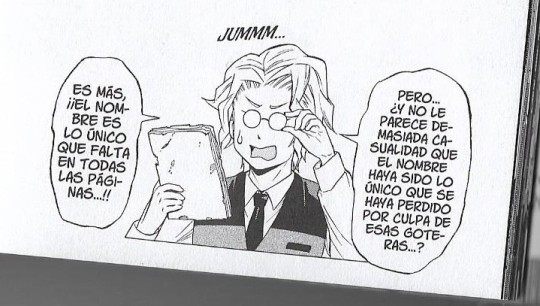

(Sorry, I didn’t find the text in english.)
We still have no clue of which one this name may be. I, a person who believes a lot in the symbolism of the names, have three in mind: Joshua, Michael and Adam. I will begin to explain them in order from least to greatest personal taste.
Joshua
The original name of Jesus Christ in Biblical Hebrew was יְהוֹשֻׁעַ yehoshua. The english variant of this name is Joshua.
Perhaps this comparison is the most obvious of the three. William's goal is to sacrifice himself for the world to make it pure. He alone bears the sins of all mankind. He is a martyr, that if we do a bit of etymology, we remember that it comes from the Greek «μάρτυς, -υρος», «witness», in the sense that he gives testimony of his faith even when he is going to be sacrificed. The main martyr in history is the figure of Jesus, with whom the manga itself has made the comparison twice.
Indeed, Sebastian Moran says that “he’s starting to look like the guy who carried a cross while climbing the hill of Golgotha, bearing all of our sins and ultimately dying alone.”

We also have an illustration (chapter 61) of William with the crown of thorns, a characteristic sign of Jesus, since they forced him to put it on his head while carrying the cross. The objective was to make fun of him: it was a deserved crown for "the king of the Jews”.
In any case, these two references with Moran present make me think that this comparison refers more to Moran's perception of William than how William sees himself.

Michael
In Hebrew: מיכאל mica.el, (literally: Who is like Him?) being its English version, Michael (pronounced /'maɪ.kl/). It is in reference to the archangel Michael, commander of God's troops in the jewish-christian religion and in charge of expelling the angels (future demons, including Lucifer) who rebelled in heaven. Of course, Lucifer would also suit him (light bearer, misunderstood angel…) but I find it a bit too dramatic.
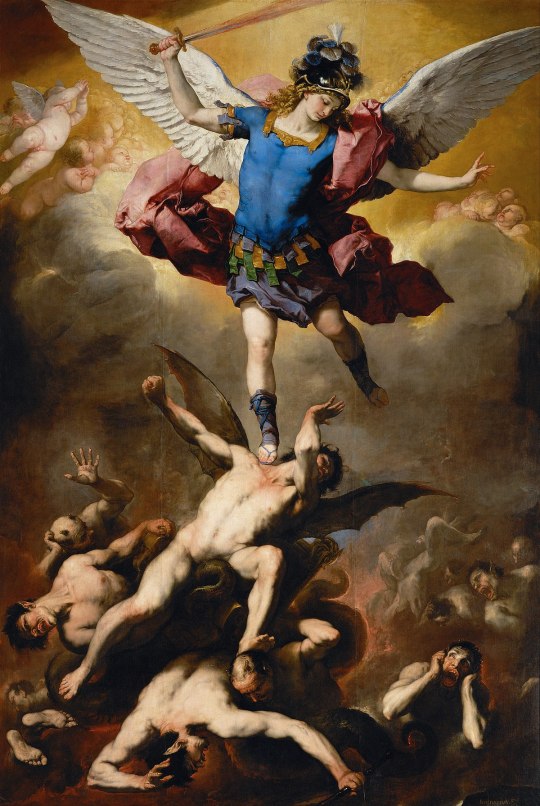
The fall of the rebel angels by Luca Giordano (c.1666)
To support this theory, according to Christopher Roden, a Holmesian expert, a fellow student at Arthur Conan Doyle's school may have served as the inspiration for Moriarty's last name. This young man was called Michael Moriarty, and in his first year of school he won a math contest by presenting a paper on the binomial theorem. Let us remember that the three Moriartys obtained a prestigious degree (The King’s Scholar) in the school where they studied, and that the thesis that gave William his doctorate was precisely about the binomial theorem.
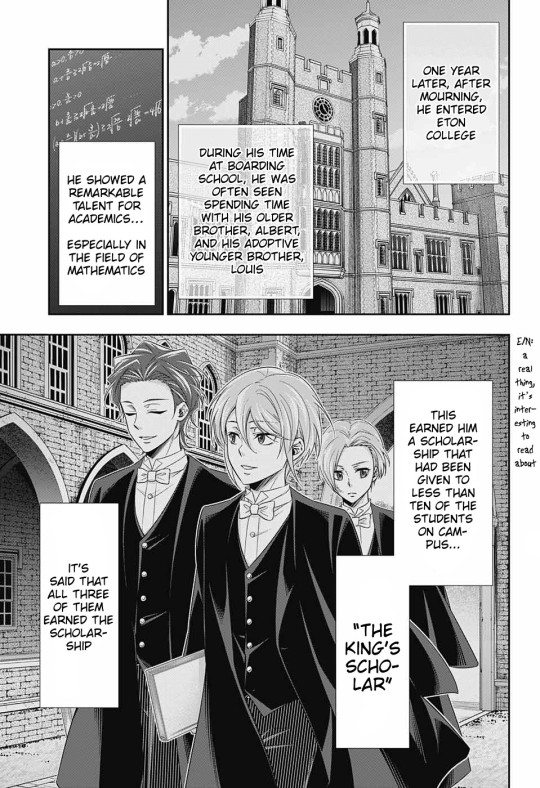
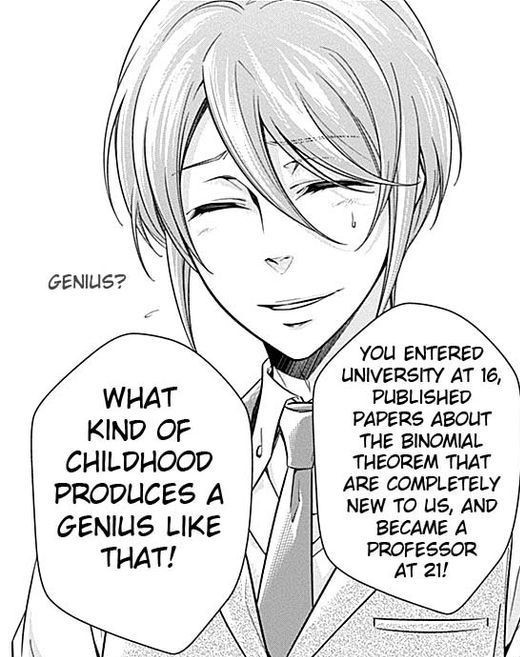
Adam
In reference to the first man, lider of mankind, and the first sinner. From the Hebrew "adamá" (אדמה) which means red clay. It can also mean blood, very appropriate for William, who seems to be obsessed with this concept: he sees his hands constantly stained with scarlet due to the guiltiness of his sins.
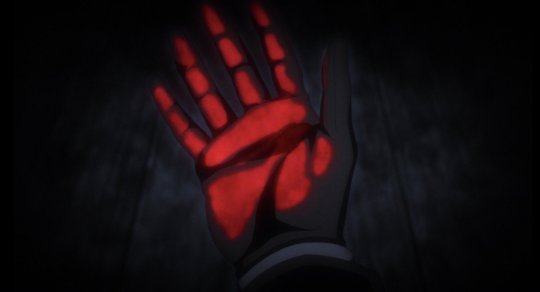

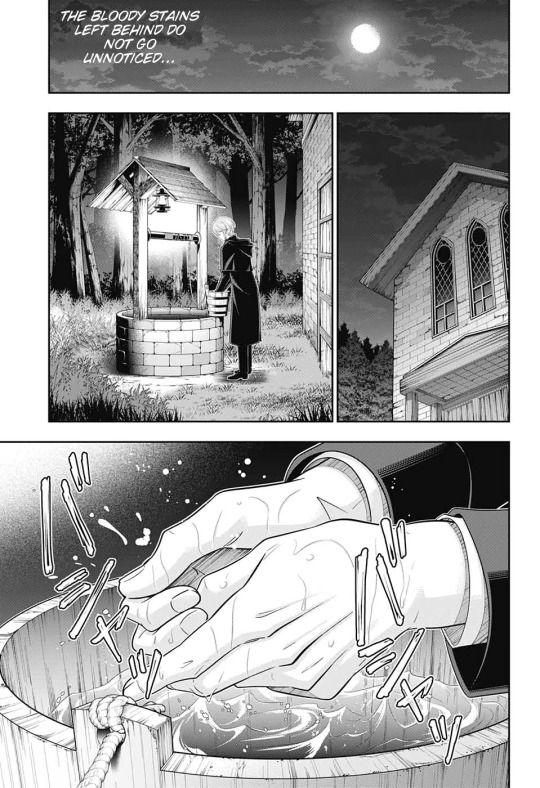

(Let me catch my breath. This scenes break my heart.)
Curiously, on the back cover of volume 9 of the Spanish version we can see that it says "The Past of the Lord of Crime is like the forbidden fruit ..."
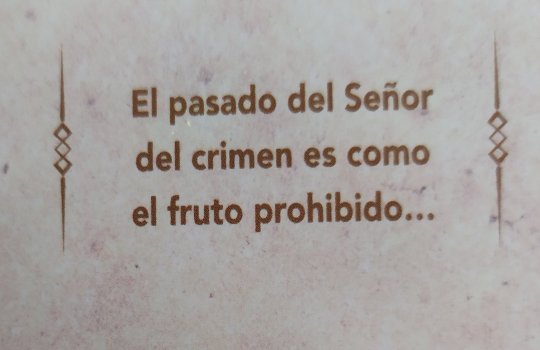
On the other hand we have the identification of Milverton with the serpent of Eden, the evil that incites to sin. This being the case, William could be Adam, who is forced to start the Final Problem earlier than expected because Milverton had agreed to reveal the identity of the Lord of Crime if he dies. Miverton, (the serpent), forces William (Adam) to sin and flee from "paradise” (tranquility and purity).


And you will say, is Sherlock Eve then, Adam’s partner? Well, although it may be funny in the first instance, if we think about it Milverton also “incites” Sherlock to sin: he forces him to kill him, sharing William and Sherlock the same crime since that night, becoming partners...in crime. (Thanks to Kiba –Laura- for this idea.)

What’s more, the real person the original Moriarty is based on was a criminal named Adam Worth. You could say that since he was the real person, Adam is Moriarty's real name.
The small drawback that I see with this name is that there is already a character in the play called like that (Adam Whiteley), but since we also have coincidences like Bill (the math student) and Billy (Billy the Kid, who rescues Sherlock and William) maybe they could just let it go.
-----------------------------------------------------------------------------------------------------------
For me, a name has a lot of power. At the end of the day, it is how we refer to a person, it is a way to identify them immediately. That is why I have tried to argue these names that in my opinion are very appropriate for the character of William James Moriarty. However, just as a name is important, so is not having it. We have already seen in yuumori that there is a lot of emphasis on William's hidden name. Even in the songs for the anime adaptation “名 前 な き 生 贄” (Nameless Sacrifice) in Dying Wish. Not knowing William's name is one of the crucial elements in the story. William acts from anonymity: he wants society to hate the "evil Professor Moriarty", while his true self (his real name) remains hidden in the shadows. The issue of the no name can already be seen in another manga work, Monster, where this fact is also given great relevance.
In conclusion, although I would like to know which the real name of William James Moriarty is, I think that part of the magic (and meaning of his character) is in not knowing it. The decision is for the authors to make. For now, I'd be happy if everyone called William however they wanted. He is still a version of the charismatic Professor Moriarty, and that name doesn’t leave anyone indifferent.

195 notes
·
View notes
Text
qual é o significado do Verdadeiro Nome Do Filho na cristandade? O ETERNO Salva não é mesmo?
Olhem pra Jeremias 11:19 a versão do Antigo Testamento franco-hebreu que eu uso é a Mechom-mamré como eu sei que um hebreupode querer verificar essa Escritura na sua língua, (outras tribos que Judá estão em Israel) eu coloco a escritura hebraica, pra que eles a possam ler na sua língua:
יט וַאֲנִי, כְּכֶבֶשׂ אַלּוּף יוּבַל לִטְבוֹחַ; וְלֹא-יָדַעְתִּי כִּי-עָלַי חָשְׁבוּ מַחֲשָׁבוֹת, נַשְׁחִיתָה עֵץ בְּלַחְמוֹ וְנִכְרְתֶנּוּ מֵאֶרֶץ חַיִּים - וּשְׁמוֹ, לֹא-יִזָּכֵו. 19 que eu era como uma ovelha dócil que era conduzida ao matadouro; o que eu não sabia é que era contra mim que eles formavam desígnios malignos: "Venham, destruamos a árvore em sua seiva, arrancemos-a da terra dos vivos e não deixe seu nome ser mencionado! "
Agora olhem isto, se trata do talmud, os próprios líderes judeus confirmando o que foi feito em Jeremias 11: 19, olhe pro nome mencionado, ele ainda não é o Nome exato, isto é uma confusão provocada por um episódio bíblico que eu vou explicar em seguida:
De qualquer forma, as narrativas de Toledoth Yeshu tipicamente explicam a designação Yeshu como um acrônimo da frase hebraica ימח שמו וזכרו - Yemach Shemô Vezichrô (Que seja esquecido seu nome e sua memória) e declararam que este nome originalmente era Yãhushua (esta é a pronuncia mais aproximada.).
Já, aqui, nos podemos ver o que significa o nome yeshua na realidade, não é pra estranhar se a maioria dos judeus não querem saber de cristianismo (fora os messiânicos), em outras versões bíblicas a palavra usada é "lembrado", são duas maneiras de ver o mesmo fato: os fariseus detestavam O Mashia (Messias em hebraico), tudo foi feito pra que O Seu Nome sumisse do coração do povo (e visto a operação necessária pra que O Nome Do Messias não seja conhecido (e reconhecido) em 1eiro pelos judeus e depois pela humanidade, podemos pensar que isso pode bem ter sido uma operação vinda diretamente do Sinédrio, aliás: Anãs e Caifas, não posso afirmar-lo mas pelo menos, se isso me fosse confirmado, eu não estranharia), o que eles fizeram é gravíssimo: ele trocaram os nomes na Palavra (o Antigo Testamento) daqueles que tinham o mesmo nome que O Mashia: Josué: o sucessor de Moisés, e o Sumo sacerdote Josué que estava em função na volta do povo de Israel depois do cativeiro na babilônia, olhem pra isto:
Êxodo 20-23
20Eis que Eu envio meu Anjo à frente de ti para que te guarde pelo caminho e te conduza ao lugar que tenho preparado para ti. 21Respeita a sua presença e ouve a sua voz, e não lhe sejas rebelde, porque não perdoará a vossa transgressão, porquanto nEle está o meu Nome. 22Mas se escutares fielmente a sua voz e fizeres o que te disser, então serei inimigo dos teus inimigos e adversário dos teus adversários. 23 O meu Anjo irá adiante de ti, e te fará chegar à terra dos amorreus, dos hititas, dos ferezeus, e Eu os exterminarei.
Foi o que ocorreu quando Josué começou a reconquista da terra prometida:
יג וַיְהִי, בִּהְיוֹת יְהוֹשֻׁעַ בִּירִיחוֹ, וַיִּשָּׂא עֵינָיו וַיַּרְא, וְהִנֵּה-אִישׁ עֹמֵד לְנֶגְדּוֹ וְחַרְבּוֹ בלו וְחַרְוּוֹ בו בוו בוו; וַיֵּלֶךְ יְהוֹשֻׁעַ אֵלָיו וַיֹּאמֶר לוֹ, הֲלָנוּ אַתָּה אִם-לְצָרֵינוּ. 13 Um dia Josué, parado na frente de Jericó, olhou para cima e viu um homem parado na sua frente com uma espada desembainhada na mão. Josué foi até ele e disse-lhe: “És tu um de nós ou um dos nossos inimigos?” יד וַיֹּאמֶר לֹא, כִּי אֲנִי שַׂר-צְבָא-יְהוָה - עַתָּה בָאתִי; וַיִּפֹּל יְהוֹשֻׁעַ אֶל-פָּנָיו אַרְצָה, וַיִּשְׁתָּחוּ, וַיֹּאמֶר לוֹ, מָה אֲדֹנִי מְדַבֵּר אֶל-עַבְדּוֹ. 14 "De jeito nenhum", respondeu ele, "sou o chefe da milícia Do ETERNO , que veio agora!" Josué prostrou-se com o rosto em terra e, prostrando-se, perguntou-lhe: O que o meu Chefe ordena ao seu servo? , קֹדֶשׁ הוּא; וַיַּעַשׂ יְהוֹשֻׁעַ, כ��ּן. 15 O líder da milícia divina disse a Josué: "Tire os sapatos dos pés, porque o lugar onde você está é santo!" E Josué obedeceu.
Aqui é óbvio que é de Cristo que se trata, e já se vê que é de Um Homem* que se trata e não de um anjo mas em Apocalipse também está Escrito Anjo, se vê bem que é de Cristo que se trata, o que é interessante é que o nome hebreu de Josué é יהושצ olhem agora Deuteronomio 3:21 e 28; é a razão pela qual no talmud O Mashia é chamado Yãhushua:
כא וְאֶת-יְהוֹשׁוּעַ צִוֵּיתִי, בָּעֵת הַהִוא לֵאמֹר: עֵינֶיךָ הָרֹאֹת, אֵת כָּל-אֲשֶׁר עָשָׂה יְהוָה אֱלֹהֵיכֶם לִשְׁנֵי הַמְּלָכִים הָאֵלֶּה - כֵּן-יַעֲשֶׂה יְהוָה לְכָל-הַמַּמְלָכוֹת, אֲשֶׁר אַתָּה עֹבֵר שָׁמָּה. 21 Eu exortei Josué naquele tempo, dizendo: “Viste com os teus olhos tudo o que o ETERNO tem feito a estes dois reis; assim fará o ETERNO a todos os reinos. Onde tu hás de entrar
כח וְצַו אֶת-יְהוֹשֻׁעַ, וְחַזְּקֵהוּ וְאַמְּצֵהוּ: כִּי-הוּא יַעֲבֹר, לִפְנֵי הָעָם הַזֶּה, וְהוּא יַנְחִיל אוֹתָם, אֶת-אְר את 28 Dê instruções a Josué, exorte-o à coragem e determinação; porque é ele o que anda à frente deste povo, aquele que o porá na posse da terra que vais contemplar. "
Como vocês podem o ver, no versiculo 21, em hebreu, Josué é chamado יהושוץ ora shua quer dizer choro, pedir ajuda, olhe como ele é chamado no versículo 28: יהושץ e sha quer dizer salva porque Ysha quer dizer Aqueleque Salva, na realidade, chamar Yausha (O Mashia) Yaushua é uma lembrança da maneira que Moisés chamou Josué no versiculo 21, ele o chamou assim porque ele chorava o fato de não poder entrar em Canaã e aomesmo tempo, pedia ajuda Ao ETERNO porque explicar que ele não podia entrar em Canaã estando justamente face àqueles que lhe provocaram a exasperação que o fez culpado e o impediu de entrar em Canaã era pra ele uma situação extremamente dificil. O nome Yãhushua (Yaushua) ficou na memória popular mas se vê bem no versiculo que o Verdadeiro nome de Josué era Yausha, ora, Yausha quer dizer YAUH (O ETERNO, O CRIADOR) Sha=Salva, o exato significado do Nome (original) Do Messias.
Foi dito Pelo ETERNO que O Seu Nome estava No Nome Do Seu Anjo, na realidade O Mashia (Messias), isto é um fato commun em Israel; olhem só alguns nomes em hebreu: Elias= ÉliYAUH; Jeremias= YrmiYAUH; Mateus= MatitiYAUH; Benjamin Netanyahu = Benyamin NetanYAUH é o melhor pro final: Yausha, O ETERNO preveu isso em Números 6:27 :
כז וְשָׂמוּ אֶת-שְׁמִי, עַל-בְּנֵי יִשְׂרָאֵל; וַאֲנִי, אֲבָרְכֵם. {ס Assim eles imporão o Meu Nome aos filhos de Israel, e eu os abençoarei. "
Nas minhas pesquisas, eu encontrei um site evangélico francês onde está claramente Escrito que O Nome original Do Salvador era (e continua sendo porque se vê bem que essas mudanças do Nome DELE não tem sentido) Yahsha, a razão deste nome é simples: o terceiro Mandamento que diz que O Nome Do CRIADOR não deve ser citado em vão, aqueles que lhes transmitiram este nome esconderam O Santo Nome Do CRIADOR como esta Escrito no Salmo 146: Louve yah=Halleluyah, na realidade, yah é um nome comum pra designar O ETERNO pros judeus mas esse nome é um diminutivo que não podemos utilizar porque, como eu o descobri recentemente, ele também é o nome da mãe de santo no camdomblé (o maligno ainda se meteu no meio de Ishral (Israel; Ishral é o verdadeiro nome em hebreu primordial) pra colocar pedra de tropeço), isso confirma O Nome Do Mashia: Yausha, aliás marque iesus na tradutora google latim português: https://www.google.com/search?q=traduction&client=ms-android-samsung-rev2&source=android-home&source=hp&ei=N2uQYYWRHYaZlwTG4K_QCw&oq=&gs_lcp=ChFtb2JpbGUtZ3dzLXdpei1ocBABGAAyAggpMggIKRCABBCxAzIFCCkQgAQyBQgpEIAEMgUIKRCABDIECCkQDTILCCkQgAQQsQMQyQMyBAgpEAoyAggpMhAIKRCxAxCDARDHARCvARAKMgIIKTIFCCkQoAEyCAgpEBYQChAeMgIIKTICCClQAFgAYI8IaABwAHgAgAEAiAEAkgEAmAEAsAEP&sclient=mobile-gws-wiz-hp
Como esse link não fonctiona mais direito, (eles mudaram tudo) eu vou explicar eu mesmo a situação:
quando se escreve Yemach Shemô Vezichrô um por um, as iniciais correspondem juntas à ישוץ que é um acrônimo que quer dizer Que seja esquecido seu nome e sua memória, ora ישוץ significa yeshua hebreu/yiddish=> yessus (grego)=> iesus latim=> jesus, de onde é que um pai e mãe chemariam o filho dizendo que o seu nome suma? Nenhum parente teria a falta de respeito e de amor de chamar o filho com um tal nome, principalmente em Israel onde o significado dos nomes é tão importante; de qualquer maneira, o fato que se possa encontrar esse acrônimo nas iniciais das palavras das quais ele vem provam que tudo que os yaudins dizem até hoje está certo, e francamente, significado que muda de um dia pro outro e de uma língua que tem a mesma raiz pra outra? Sejamos sérios
Achei como explicar o nome iesus:
Ie= ou seja => passar pro francês (traduzir) = c'est à dire, juntar le cochon (o porco) => ie porcum; à variante que nos interessa: ie sus domesticus => c'est à dire le cochon domestique traduzido: ou seja, o porco domestico, e como por acaso, antes tudo junto fonctionava e hoje não fonctiona?
A conclusão é que iesus (jesus) quer dizer, ou seja: porco.
Terrível, não é mesmo? E os romanos de Constantino sabiam disso muito bem (eles falavam latim) mas alguém também sabia disso, ele provocou tudo isto inspirando todos os protagonistas dessa triste e terrível história, a começar pelos dirigentes religiosos judeus sabendo como este nome seria traduzido: o maligno em pessoa, isso confirma o que está Escrito em Daniel 7:19-25; e aqui se vê bem que as blasfêmias proferidas concernam não somente O PAI mas também O Filho, agora olhe bem a explicação do *, quando eu disse que O Filho é apresentado como sendo um Homem em Josué 5-13-14: 1eiro lêem isto:
Pois há Um só CRIADOR, e Um só Mediador entre O CRIADOR e os homens, um Homem, YAUSHA o Mashia
(Bíblia de Jerusalem, versão revisada com os nomes israelitas usados nos tempos bíblicos e sem os acréscimos citados no rodapé da Biblia Almeida e unicamente com os evangelios sem fermento, alguns Livros também não são incluídos porque a sua origem é equívoca, isso não quer dizer que O Livro é ruim (o Livro de Hebreus em particular) mas eles não quiseram tomar risco algum
É agora e por último, lêem isto:
Colossenses 1:15-29:
Ele é a Imagem Do CRIADOR invisível, O Primogênito de toda criatura, 16porque NEle foram criadas todas as coisas, nos Céus e na terra, as visíveis e as invisíveis: Tronos, Soberanias, Principados, Autoridades, tudo foi criado por intermédio DEle e para Ele. 17Ele é antes de tudo e tudo veio a existir por intermédio DEle. 18Ele é a Cabeça da congregação, que é o seu Corpo. Ele é o Princípio, o Primogênito dos mortos, 19pois nele aprouve O CRIADOR fazer habitar toda a Sua Natureza 20e reconciliar por Ele e para Ele todos os seres, os da terra e os dos céus, realizando a paz pelo Sangue da Sua cruz.
Podemos ler claramente no versiculo 15 que O Mashia é bem A Primeira Criatura, não CRIADOR: Criatura, Ele é O Primeiro Homem, Glorificado mas Homem, Ao mesmo tempo Filho Do CRIADOR e 1eira Criatura
Está é a versão da Biblia de Jerusalem, nas outras versões se pode ler no versiculo 16 pra Ele e por Ele, mas quando se olha pra versão Strong francesa se pode ler o significado da palavra "por" Ele: através DEle, o que corresponde bem à palavra por intermédio DEle
Aqui se entende bem porque a família é a base de organização da humanidade: O PAI faz participar O Filho da Sua Criação, tudo é feito em Família, no Amor Familial; isto é Maravilhoso, e hoje e desde o começo, O Nosso CRIADOR e PAI, e também O Nosso Irmão Primogênito, cujo Nome é Yausha querem que nós também façamos parte Da Família, foi por Amor por nós que O PAI Sacrificou O Seu Filho, porque ELE nos Ama, ELE quer nos resgatar pra que nos possamos fazer parte da Família, nós que estamos no pecado, e O Filho se ofereceu Ele mesmo em Sacrifício pra que nós possamos ser considerados como os seus irmãozinhos, Ele que é O Nosso Irmão Primogênito, porque Ele, como O PAI, nos Ama e preferiu morrer por nós do que nos ver nos perder, porque se, porque nós estamos no pecado, não podemos fazer parte da Família, então Ele, como O PAI, nos Amou por avanço, no Coração DEle, Ele nos Amava (e nos Ama), Ele decidiu de morrer nos considerando como os Seus futuros irmãozinhos e irmãzinhas, e se Ele tinha que viver a nossa vida de sofrimento e dificuldades nesta terra e morrer por nós, não pela ação da cruz, mas pela ação dos nossos pecados sobre Ele, porque foram eles que O Mataram e não a cruz, então Ele estava pronto, não foi uma força do tipo entidade Criadora que lhe permitiu levar tanto pecado sobre Ele porque senão, o Seu Sacrifício não teria sido válido porque o Seu sofrimento por nossos pecado tinha que ser como o nosso, o sofrimento de um Homem, foi o Seu Amor por nós que lhe permitiu viver esse terrível Sacrifício; Ele mesmo se chamou de homem: "O Filho Do homem", Ele é 100% homem, Glorificado mas Homem. O PAI e O Filho nos Amam de um Amor Eterno e Infinito porque, e é o que compreendo nesta passagem, se somos uma Família, os membros de uma Família não se abandonam entre si, pelo contrário, eles se dão assistência, porque eles se amam entre si, eles são uma família❤🙏😍🤗, e se essa assistência significa fazer um Sacrifício ou morrer pelos outros membros, o amor familial operara o Sacrifício, porque é um ato de Amor, o Amor Supremo.❤💖💝
12 notes
·
View notes
Text
יֵשׁוּעַ – Yēšūaʿ in Hebrew) was a common alternative form of the name יְהוֹשֻׁעַ (Yəhōšūaʿ – Joshua) in later books of the Hebrew Bible and among Jews of the Second Temple period. The name corresponds to the Greek spelling Iesous (Ἰησοῦς), from which, through the Latin IESVS/Iesus, comes the English spelling Jesus.[1][2]
The Hebrew spelling Yēšūaʿ (ישוע) appears in some later books of the Hebrew Bible. Once for Joshua the son of Nun, and 28 times for Joshua the High Priest and other priests called Jeshua – although these same priests are also given the spelling Joshua in 11 further instances in the books of Haggai and Zechariah. It differs from the usual Hebrew Bible spelling of Joshua (יְהוֹשֻׁעַ Yəhōšūaʿ), found 218 times in the Hebrew Bible, in the absence of the consonant he ה and placement of the semivowel vav ו after, not before, the consonant shin ש. It also differs from the Hebrew spelling Yeshu (ישו) which is found in Ben Yehuda's dictionary and used in most secular contexts in Modern Hebrew to refer to Jesus of Nazareth, although the Hebrew spelling Yēšūaʿ (ישוע) is generally used in translations of the New Testament into Hebrew[3] and used by Hebrew-speaking Christians in Israel. The name Yeshua is also used in Israelite Hebrew historical texts to refer to other Joshuas recorded in Greek texts such as Jesus ben Ananias and Jesus ben Sira.[4]
In English, the name Yeshua is extensively used by followers of Messianic Judaism,[5] whereas East Syriac Christian denominations use the name Isho in order to preserve the Aramaic name of Jesus.[6] The 2004 film The Passion of the Christ, which was made in Aramaic, used Yeshua as the name of Jesus and is the most well known western Christian work to have done so.[7]
The father God sends his son Jesus to show how much love he has for us. Both together show so much love that we all can be together by learning how to love as much as our lord and savior has!!
7 notes
·
View notes
Text
Listen Yisrael! יְהוֹשֻׁעַ - Yehoshua is the Hebrew name for the Savior, given to his parents by the angel of Yehovah-God, Matthew 1:18-25.
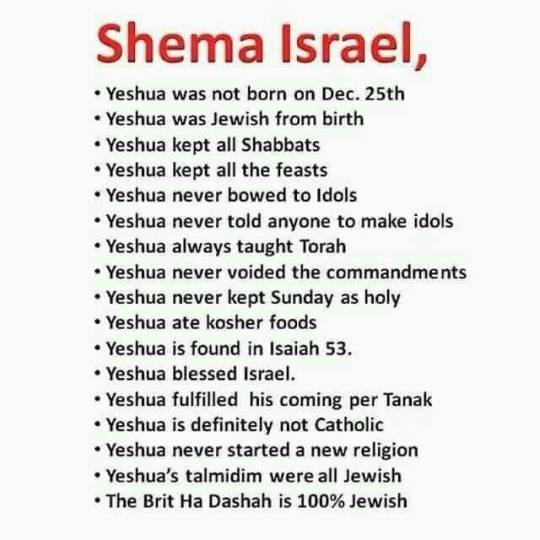
#thewayofyehoshua#yeshua#yehovah#hebrew#yehoshua#yhvh#messianic judaism#people of the way#yeshua messiah#torah
9 notes
·
View notes
Text
Significato del nome Gesù
Gesù è l'adattamento italiano del nome aramaico יֵשׁוּעַ (Yeshu'a), passato in greco biblico come Ἰησοῦς (Iēsoûs) e in latino biblico come Iesus; si tratta di una tarda traduzione aramaica del nome ebraico יְהוֹשֻׁעַ (Yehoshu'a), ovvero Giosuè, che ha il significato di "YHWH è salvezza", "YHWH salva". Questo nome è noto a livello internazionale per essere stato portato da Gesù, detto "il Cristo", figura centrale del Nuovo Testamento, adorato come il figlio di Dio dai cristiani e considerato un importante profeta anche dai musulmani.
Significato di "Messia"
Messia è il termine che designa una figura e una nozione importante per le tre principali religioni monoteistiche abramitiche: ebraismo, cristianesimo e l'islamismo. In tali religioni si crede che a un certo punto della storia debba comparire un inviato da Dio con il compito di eliminare le contraddizioni della condizione umana attuale.
Il Messia, salvatore e risolutore del tempo attuale, è l'instauratore di un tempo nuovo e definitivo (eschaton),che corrisponde, per i suoi vari contenuti di felicità e perfezione, alle aspirazioni della comunità che lo attende. Il Messia abolisce la realtà attuale e la sostituisce con una nuova realtà che, almeno nelle prospettive, si presenta come metastorica e mitica.
Nel cristianesimo la figura del Messia coincide con quella di Gesù Cristo quindi, di fatto, per i cristiani il Messia è già comparso e se ne aspetta la seconda venuta.
Anche l’Islam, come il Cristianesimo, attende il ritorno di Gesù alla Fine dei Tempi. Assunto in cielo da Allah, il “figlio di Maria” é destinato, secondo l’Islam, a ritornare nei Tempi Ultimi. Con un compito speciale: annientare al-masih al-dajjal, l’anticristo.
Breve biografia
Nella fede islamica, il profeta Isa ibn Maryam (Gesù, figlio di Maria), o profeta Gesù, è inteso come il penultimo profeta e messaggero di Allah (Dio) e al-Masih, il termine arabo per Messia (Cristo), inviato guidare i Figli di Israele (bani israeliano in arabo) con una nuova rivelazione: al-Injil (arabo per "il Vangelo"). Si crede che Gesù sia un profeta che non ha sposato né avuto figli e si riflette come una figura significativa, trovandosi nel Corano nel 93 ayaat (arabo per versi) con vari titoli allegati come "Figlio di Maria", "Spirito di Dio e la "Parola di Dio" tra gli altri termini relazionali, menzionati direttamente e indirettamente, oltre 187 volte. Il profeta Gesù è la persona più citata nel Corano, 25 volte con il nome di Isa, 3a persona 48 volte, 1a persona 35 volte, il resto come titoli e attributi.
Il Corano (testo religioso centrale dell'Islam) e la maggior parte degli Hadith (testimonianze) menzionano il profeta Gesù come nato come "ragazzo puro" (senza peccato) a Maria (Maryam) come risultato del concepimento verginale, simile all'evento di l'Annunciazione nel cristianesimo.
Nella teologia islamica, si crede che Gesù abbia compiuto molti miracoli, molti dei quali sono menzionati nel Corano come parlare da bambini, guarire vari disturbi come la cecità, risuscitare i morti, fare uccelli con l'argilla e respirare la vita. Nel corso dei secoli, gli scrittori islamici hanno fatto riferimento ad altri miracoli come scacciare demoni, avendo preso in prestito da fonti pre-islamiche, alcune eretiche e da fonti canoniche man mano che le leggende su Gesù si espandevano. Come tutti i profeti del pensiero islamico, anche il profeta Gesù è chiamato musulmano (uno che si sottomette alla volontà di Dio), poiché predicava che i suoi seguaci avrebbero dovuto adottare la "retta via". Il profeta Gesù è scritto da alcuni studiosi musulmani come l'uomo perfetto.
Nell'Islam, si ritiene che il profeta Gesù sia stato il precursore del profeta Muhammad SAW, attribuendo il nome Ahmad a qualcuno che avrebbe seguito Gesù. L'Islam insegna tradizionalmente il rifiuto della divinità, che Gesù non era Dio incarnato, né il Figlio di Dio e, secondo alcune interpretazioni del Corano, la morte e la crocifissione sono ampiamente negate e non si ritiene che siano avvenute. Nonostante le prime tradizioni ed esegesi musulmane citino resoconti in qualche modo contrastanti riguardo alla morte e alla lunghezza della morte, la convinzione musulmana tradizionale è che il profeta Gesù (Isa) non ha subito la morte ma è stato invece portato in vita in cielo (cielo).

13 notes
·
View notes
Text
joshua meaning
Got curious what my name means. Initially, I recall the bible character Joshua and I think the meaning of my name is “fulfiller of promises” as he is the descendant of Moses who failed to bring the Hebrews to the promised land. Nope. I was wrong.
From the Hebrew name יְהוֹשֻׁעַ (Yehoshu'a) meaning "YAHWEH is salvation", from the roots יְהוֹ (yeho) referring to the Hebrew God and יָשַׁע (yasha') meaning "to save". ... After Moses died Joshua succeeded him as leader of the Israelites and he led the conquest of Canaan.
Then, found this instead:

1 note
·
View note
Text
The Best Goods
ב"האָמַר רַבִּי יְהוֹשֻׁעַ בֶּן לֵוִי, בְּכָל יוֹם וָיוֹם בַּת קוֹל יוֹצֵאת מֵהַר חוֹרֵב וּמַכְרֶזֶת וְאוֹמֶרֶת אוֹי לָהֶם לַבְּרִיּוֹת מֵעֶלְבּוֹנָהּ שֶׁל תּוֹרָה שֶׁכָּל מִי שֶׁאֵינוֹ עוֹסֵק בַּתּוֹרָה נִקְרָא נָזוּף (אבות ו, ב) SAID R. YEHOSHUA THE SON OF LEVI: EVERY DAY A HEAVENLY ECHO GOES OUT FROM MOUNT CHOREV (SINAI) AND ANNOUNCES, “WOE TO THE CREATURES FOR SHAMING THE TORAH,” FOR ANYONE WHO DOES NOT ENGAGE IN TORAH IS CALLED “SHUNNED.” (PIRKEI AVOS 6:2)
Torah study is the foundation of Jewish life, and a requirement far greater than merely a question of being called “shunned.” So what additional motivation to study Torah does this statement from the Mishna convey?
No rainbow was seen throughout the lifetime of R. Yehoshua ben Levi, the Talmud (Kesubos 77b) relates. This is a testament to his positive impact on the people of his generation, such that the symbol of G-d’s oath not to destroy the world regardless of man’s unfavorable conduct became unnecessary. Implied is that R. Yehoshua was unique among the sages in his efforts to influence the people of his time and to positively transform the environment in which he lived.
Therein lies R. Yehoshua’s message to those who may already study the Torah, and perhaps even teach it, but are slow to engage in drawing others to explore and benefit from its wisdom. Failing to recognize the Torah’s value for society at large, and therefore only studying alone or with those who join you of their own accord, is comparable to not appreciating or respecting the value of others—conduct that is obviously reprehensible.
If you appreciate the Torah’s greatness and appeal, don’t go about it like an employee fulfilling his obligations; engage in it as though you are a businessman and the Torah is your merchandise! Promote your wares enthusiastically to everyone you can possibly reach, with the excitement that every word of Torah that you spread generates profit and income, bringing another heart and mind under the Torah’s Divine influence.
—Likutei Sichos, vol. 4, pp. 1228-1232
5 notes
·
View notes
Text
Random Fact #3,247
Jesus' name translated from Hebrew to English would be Joshua (יְהוֹשֻׁעַ).

We get the name 'Jesus' by translating the Hebrew name to Greek to Latin to English.
4 notes
·
View notes
